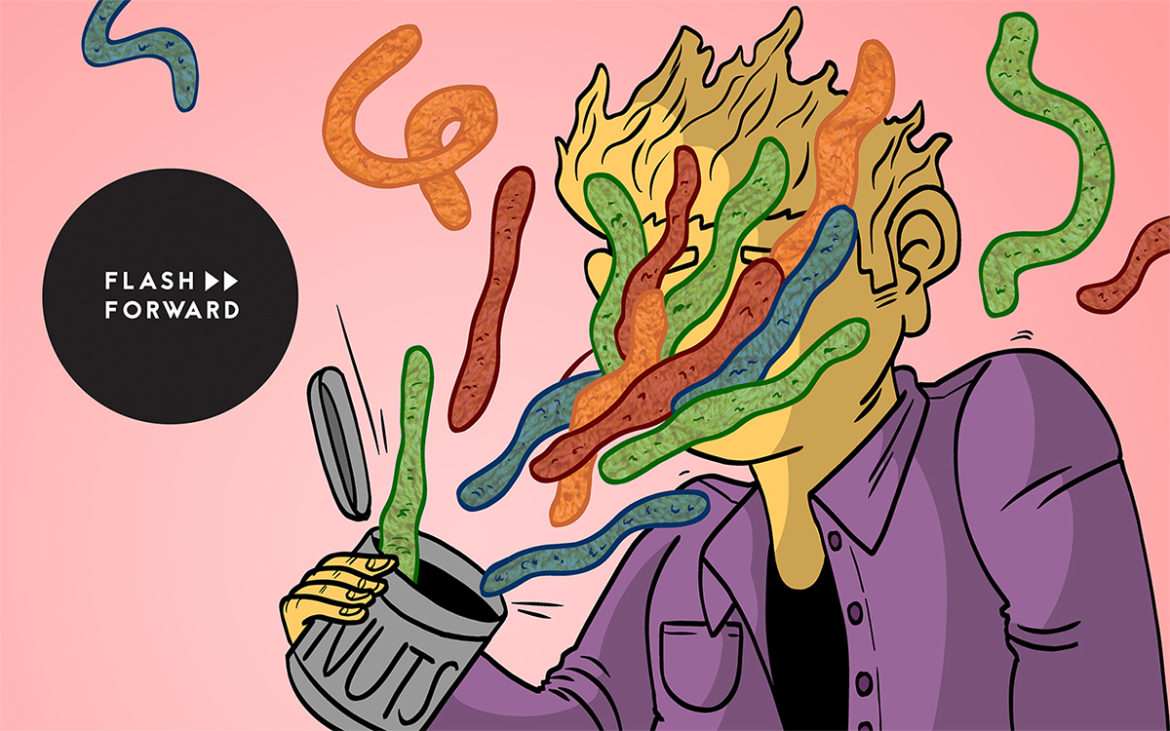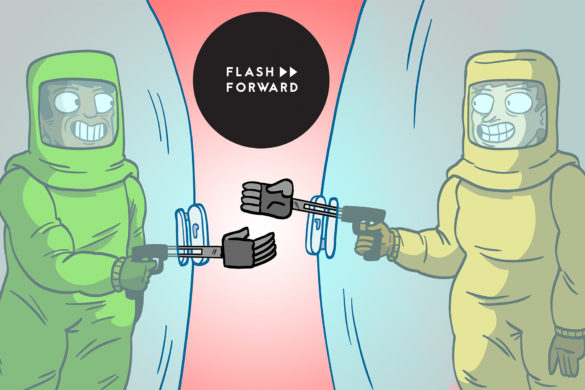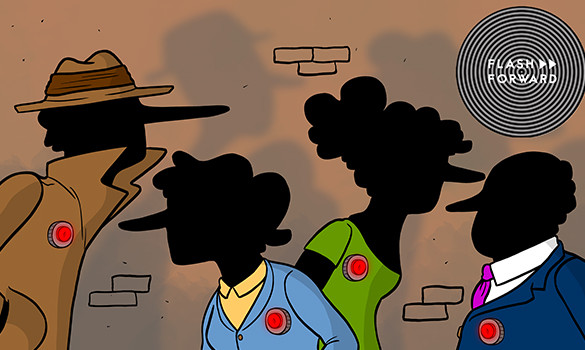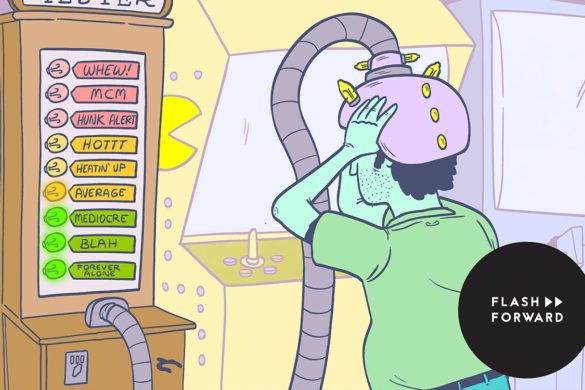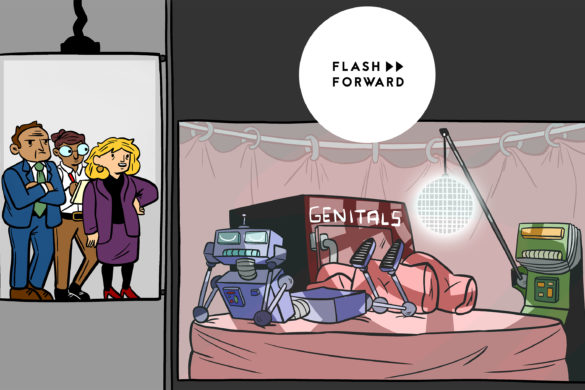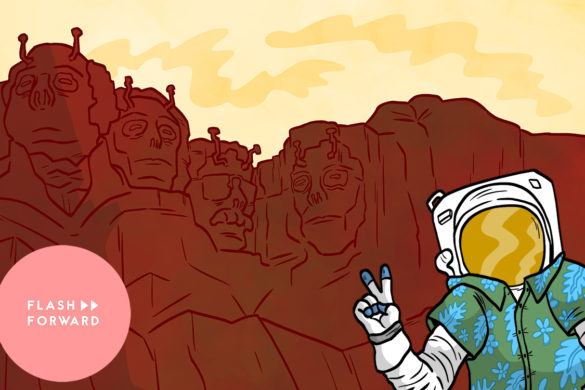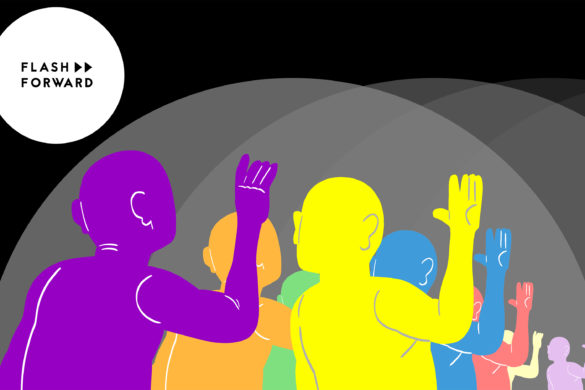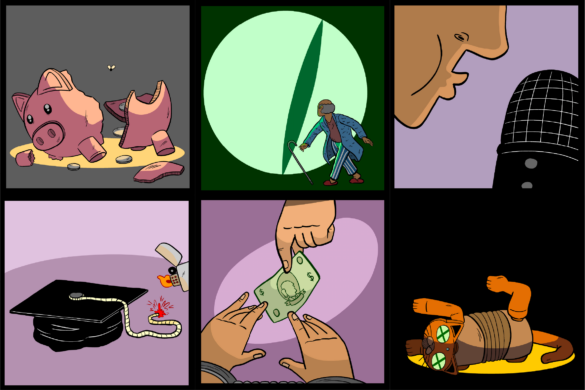This episode we travel to a future where you can choose to turn off your ability to deceive yourself. Are you now a perfectly clear eyed genius? Or a perpetually depressed misanthrope? Maybe both?
This episode was suggested by my mom. It begins with two tales of self deception, one from Jacquelyn Gill, an assistant professor of paleo-ecology at the University of Maine and the host of a podcast about climate change called Warm Regards, and the other from Beth Duckles, a writer, researcher, ethnographer and social scientist. Then we talk to Zoë Chance, an assistant professor of marketing at the Yale School of Management and an expert on self-deception. After that, we go to therapy, and Chamin Ajjan, a clinical psychotherapist and author of Seeking Soulmate: Ditch the Dating Game and Find Real Connection explains what she does when she sees a case of self-deception in her office. And finally, Erik Vance, science journalist and author of Suggestible You: The Curious Science of Your Brain’s Ability to Deceive, Transform, and Heal helps us understand what might really happen if we could truly turn off this ability to deceive ourselves.
Further reading:
- Stanford Encyclopedia of Philosophy: Self Deception
- The Elements of a Scientific Theory of Self-Deception
- People don’t know when they’re lying to themselves
- Temporal view of the costs and benefits of self-deception
- The slow decay and quick revival of self-deception
- DENIAL: Self-Deception, False Beliefs, and the Origins of the Human Mind
- Suggestible You: The Curious Science of Your Brain’s Ability to Deceive, Transform, and Heal
- Seeking Soulmate: Ditch the Dating Game and Find Real Connection
Patrons are going to get a really fun bonus segment next week that didn’t quite make it into this episode. It’s about hypnosis. So if you want that, go to Patreon and sign up as a $5 donor!
Flash Forward is produced by me, Rose Eveleth. The intro music is by Asura and the outtro music is by Hussalonia. The voice from this episode’s future was provided by Cynthia Graber. The episode art is by Matt Lubchansky.
If you want to suggest a future we should take on, send us a note on Twitter, Facebook or by email at info@flashforwardpod.com. We love hearing your ideas! And if you think you’ve spotted one of the little references I’ve hidden in the episode, email us there too. If you’re right, I’ll send you something cool.
And if you want to support the show, there are a few ways you can do that too! Head to www.flashforwardpod.com/support for more about how to give. But if that’s not in the cards for you, you can head to iTunes and leave us a nice review or just tell your friends about us. Those things really do help.
That’s all for this future, come back next time and we’ll travel to a new one.
▹▹▹▹▹▹▹▹▹▹▹▹▹▹▹▹▹▹▹▹▹▹▹▹▹▹▹▹▹▹▹▹▹▹▹▹▹▹▹▹▹▹▹▹▹▹▹▹▹▹▹▹▹▹▹▹▹▹▹▹▹▹▹▹▹▹
TRANSCRIPT
Rose: Hello and welcome to Flash Forward! I’m Rose and I’m your host. Flash Forward is a show about the future. Every episode we take on a specific possible… or not so possible future scenario. We always start with a little field trip to the future, to check out what’s going on, and then we teleport back to today to talk to experts about how that world we just heard might really go down. Got it? Great!
Just as an FYI, this episode includes discussions of both sex and abusive behavior.
Okay, let’s go to the future. This episode we’re starting in the year 2033.
[[meditative music]]
Soothing woman voice: Hello, and welcome to the Ubik Mindfulness Program. Please tap the center of your screen three times to begin.
[[soothing sounds]]
You are about to complete the Ubik Honesteco Training Module. At the end of this module, you will be completely unable to deceive yourself in any way. Before we begin, please read the privacy and efficacy policy carefully. This program is completely voluntary. Changing your brain comes with some risks. Once you have read and agreed to the policy, tap the center of your screen three times.
[[tap tap tap]]
Excellent. Let us begin.
Lay on a comfortable surface with your legs uncrossed.
Place your phone in the center of your stomach or chest. Feel the weight of the device, gently pressing down through your body, down, into the earth.
Look up. Notice how the ceiling above you looks. Is it flat, one unified plane of color? Is there texture? How does the light fall? Now pick a spot on the ceiling, a small spot, the size of a quarter, and focus. Pool all your focus into that spot.
Relax your feet, your legs, your abdomen. Relax your hands, your arms, your shoulders. Close your eyes and feel your mind lifting you up towards the spot on the ceiling, while your phone holds you softly, firmly down.
Think of nothing but the idea of that spot. Let it expand to swallow your entire mind. Let your mind look right, and left, and in every direction it is all the same. An endless plane of possibilities.
Here in this mind, there are no tricks. No traps of any kind. This is the mind we are going to build for you now. This is where you will live, free from your own deception. Free from letting yourself believe things you know not to be true.
In this mind, you will never again fool yourself into giving him one more chance.
In this mind, you will never again trick yourself into believing that you deserved that promotion.
In this mind, you will never again convince yourself that your potato salad is better than Maria’s.
Yes, I know about Maria’s potato salad.
In this mind, you will see the world exactly as it is. You will be clear and unfettered by .
Are you ready?
Excellent. Let us really begin.
[[music down]]
Rose: So in this future, you can “turn off” your brain’s ability to trick itself. You can no longer fool yourself into thinking that you can still make it to class even if you sleep a couple more minutes. You can’t trick yourself into thinking your abusive boyfriend is a nice guy and just needs to be saved. You can’t con yourself into thinking you totally deserve that promotion when, maybe you actually don’t.
You have probably deceived yourself before. You probably started doing it when you were really young.
Jacquelyn Gill: When I was like three I was just staring at a brick wall talking to it. And they were like Jackie who are you talking to there. And I was like Mr. Ghost!
Rose: This is Jacquelyn Gill
Jacquelyn: I’m an assistant professor of paleoecology at the University of Maine.
Rose: Jacquelyn is also one of the hosts of a podcast about climate change called Warm Regards. But before all of that, she a kid. And like a lot of other kids she was scared of being alone in her room at night.
Jacquelyn: So there was this weird sort of progression of monsters or ghosts like first the ghosts would come through that would get you if they heard you make a noise. And then the ghost would come through that would get you if they saw you move so you could make a sound but they couldn’t see you moving like even breathing. And then were the ghosts that would get you if you moved or made a sound right. And so you can imagine like just this kid laying in bed just stiff with terror you know waiting for that moment when the ghost would finally come.
Rose: So she enlisted the help of her friend, Mr. Ghost.
Jacquelyn: I think I just asked him for help. He was like “well I can program your bed to protect you from these monsters.” The headboard of my bed became something like a control panel like what you might see on you know on Star Trek. The bed could essentially have a force field which was incredibly useful because that solves the problem of the ghosts being able to get you when they come through your room. The problem though came very quickly when I realized that sometimes I had to go to the bathroom. And so after some discussion and trouble shooting Mr. Ghost and I came up with the solution which was all right so there’s a camera and it’s going to film you sleeping. And then what we’re going to do is we’re going to project a hologram of you in the bed from that recording and also basically do the equivalent equivalent of a Romulan cloaking device. So you will be invisible when you leave the forcefield of the bed. But this only lasts for 60 seconds because you know even even then as a child I knew that there were limits to technology right.
Rose: Now Mr. Ghost wasn’t always around watching, he had other kids to help too.
Jacquelyn: And so once he set up the board the headboard it was up to me. So I had to learn the technology. I would push some buttons for recording and then I push a couple of more buttons when it was time to like jump out of bed and activate the hologram. And the funny part is so I moved around a lot as a kid. My dad and my step-dad were both in the Navy so I was often bouncing back and forth different places. And any time I got to a new bed in a new place he had to set up all the technology again and so I’d have to sort of call Mr. Ghost. He’d show up program the headboard again and then I’d be safe
Rose: As adults, it’s easy for us to forget that even though this sounds cute and kind of funny, the monsters and ghosts and imaginary friends that kids have can feel SO real.
Jacquelyn: It felt incredibly real to me. I mean my heart would race you know when I knew the ghosts were in the room. And you know even like running to the bathroom like I was I was counting down in my head the seconds you know I was like running really quickly. You know peeing as fast as I could and kind of getting back and then it was like this a palpable relief of nothing can get me. I’m safe now.
Rose: This kind of thinking, this magical way that kids can build fictional worlds to help them get through scary or strange situations, it doesn’t really last. Jacquelyn can’t quite remember when exactly Mr. Ghost stopped showing up for her. It probably happened slowly, like with all the rest of her imaginary friends.
Jacquelyn: I remember like feeling this sense of guilt that a long time had gone by without my thinking about them you know and sort of kind of promising to myself I would never forget these friends. Um… I don’t know why I’m getting a little bit emotional. It seems really strange. But yeah just the sense of like, oh I forgot about my friends. And then I’d feel badly about that for a bit. And then like you know longer and longer stretches would go by and eventually you just sort of start thinking about them altogether.
Rose: When you’re a kid these can feel like real relationships. So losing them, feels like a real loss. Today, Jacquelyn doesn’t think about Mr. Ghost all that much. Unless some nosey journalist like me shows up I guess. But she hopes that Mr. Ghost is still available, out there, somehow, if she ever needs him.
Jacquelyn: You know I do think about it is if if I ever have a child of my own sort of passing that on to them. Sorry I don’t know why, I’m crying, this is so weird. I think he’s you know like he’s, he’s out there and you know I like to think that other little kids who might need that could also have that in their lives.
Jacquelyn grew out of her monster fear phase, or maybe Mr. Ghost just moved on to help other kids, but this is probably one of the first ways that most people really engage in large scale self-deception — inventing stories that feel true, that we really believe about ourselves and our world. But we don’t always just grow out of those stories as we get older. Beth Duckles, spent 20 years of her life thinking she was allergic to peanuts.
Beth Duckles: At some point I started to have stomach aches. And my mom took me to the doctor to the pediatrician and they said well you know what are the allergies in your family? my father’s always been allergic to peanuts and he’s the kind of guy who has an epi pen that he takes with him and and uses when even the smallest amount of trace allergies or peanuts are there. And so they started to take me off of peanuts and they also at the same time had me not eat milk or eggs. And apparently my stomach aches went away. I got asthma around that time as well. And so I sort of turned into that I was allergic to peanuts. And people ask me what happens when you have peanuts. And I said I don’t know I think it’s asthma. And so then it turned into well if I eat peanuts then I get an asthma attack which I never really experienced. But I thought well that seems to make sense.
Around the same time, a little girl in Beth’s school died from exposure to peanut oil. So the parents around her were extra on guard about peanut allergies.
Beth: And so I got that red tag that said that I had peanut peanut allergy and that meant that you know everybody was really conscious. Nobody wanted to put anything in the room that had peanuts in it. When I would taste peanut butter I would spit it out and then take my inhaler. Halloween would come around and you know I’d give away all of my peanut candy and so I never knew what a Butterfinger tasted like. I never knew what a Snickers tasted like. I would happily trade you know a bunch of Smarties for like a couple of Snickers bars or something.
Rose: Twenty years later, Beth developed other allergies and finally went to an allergist who did some tests.
Beth: And he did the skin tests and I’m I’m not at all allergic to peanuts.
Rose: Not allergic to peanuts. Not even a little bit.
Rose (in interview): So once you learned you didn’t have this peanut allergy did you go out and eat a bunch of peanut stuff? What did you do?
Beth: Yeah yeah I did! It was a little bit scary, I have to say, because I used to think it was something I really had to avoid, I used to not sit next to people who were eating peanuts. I sort of like tentatively tried a few things and that. OK we’ll see what it tastes like. First thing I tried was a Reese’s Cup because I thought those were cool.
Rose: Today, Beth is a sociologist and a writer, and she still has friends who think she’s allergic to peanuts.
Beth: I had a dear friend who’s known me for a long time and he knew me as a kid and so he knew I had a peanut butter allergy and we were together and I think it might have been like one of those West African peanut soups. Somebody was serving it and he saw that I was about to take a bite of it and just went running across the room said “Beth! That has peanuts in it!” And I was like yeah ok. Turns out I’m not allergic. And just the look on his face..
Rose: And Beth says that this whole thing kind of freaked her out. Not the Reese’s Peanut Butter cup or the peanut soup, but the fact that she could spend 20 years of her life truly believing something about herself that was completely untrue.
Beth: I had a small existential crisis, to be honest, after it happened because I was I mean I really had believed myself to be somebody who was who had a peanut allergy like that. That was just part of who I was. And then, it was probably never actually there to begin with.
Rose: This is maybe an extreme example, but I’m sure many of you have had moments where you realized that something you believed to be true about yourself simply wasn’t. For the longest time I thought I liked running. It turns out, I actually do not like running, but I felt like I SHOULD like running.
For this episode, we’re going to call this kind of broad concept “self deception,” which is sort of a slippery term.
Zoë Chance: Self deception is is hard to define only because people have different definitions of self-deception.
Rose: This is Zoë Chance, an assistant professor of marketing at Yale School of Management. And one of the things Zoë has studied is self-deception.
Zoë: All that’s important is that there’s a false belief and there’s some motivation for that false belief. It’s not just a mistake that we’re making it’s something we’d like to believe but that doesn’t.
Rose: Actually studying self-deception, is pretty hard. Because most of the time we don’t know we’re doing it.
Zoë: We can’t put somebody in a brain scanner and have the brain scan or tell us oh this is the other thing that they really believe. So we just look for signs and we can test people’s behavior.
Rose: But Zoë has done some really neat experiments in the lab that demonstrate the power and persistence of self-deception.
Zoë: We have people come into the lab, and we give people a sort of like an IQ type or essay type math quiz where they answer 10 questions. And tell them that they’re taking is a practice test
Rose: She also tells people that after this practice test they’re about to take, they’re going to be asked to predict how well they might do on the real version.
Now, half the people in this experiment get a regular test. But the other half get a test that has the answers “accidentally” included at the bottom.
Zoë: Either they have a cheat sheet that they can look at or they don’t have a cheat sheet that they can look at
Rose: Now, maybe this says something not so flattering about me, but I was really surprised that people with the cheat sheet didn’t always give themselves perfect scores.
Zoë: It’s not like everybody gets 10 points the first on the first round even though they could with the cheat sheet. It’s more like they just score a little bit higher by one or two points than they do without the cheat sheet.
Rose: Once they’re done with the test, Zoë asks each group to predict how well they’ll do on the next one. And she adds an incentive — if your prediction is accurate, you get a little bit of money.
Zoë: The strongest evidence that we have that they’re self-deceiving when of course they’ve cheated on the first test is when they predict that they’re still going to do just as well on the second test, even when we’ve paid them to be accurate on that prediction.
Rose: So even though they knew they would not get the answers in the next test, and even though they KNEW that they looked at the answers while working on the test, people who got the cheat sheet believed they would do better than the people without. The cheating group predicted they would get 81% next time. The non-cheating group predicted that they would get a 72%. Having the answers provided made people feel more confident in their own abilities. And that confidence didn’t pan out — when the two groups took the next test, they performed equally.
Then Zoë did a follow up, to see how long that self deception lasted in people who got the answers with the test.
Zoë: OK so so people deceived themselves and they think that they’re brilliant and that they really didn’t need that cheat sheet at all and they would have done just as well without it. But then they get their actual score. They take a second test and they get their actual score without the cheat sheet. Once you have that information. Do you still think that you’re brilliant or do you quickly come down to earth and reconcile with reality?
Rose: So they had the next set of subjects repeat the process several times. First, they got the cheat sheet, which over inflated their confidence, and then they took the test over and over again without the cheat sheet, predicting each time how they would do.
Zoë: And what we found was that by the fourth time people were pretty well calibrated but it actually took that long for most people’s self-deceptive optimism to diminish. So even though you’ve gotten your answer say, on the first round, even though you find out: “All right I thought I was going to do a lot better. But actually I didn’t.” I guess you tell a story to yourself like oh well this test was harder than the previous one. So how am I going to do on the next one. I’m still going to do really well. I’m going to do better than I did this time. And it. And it’s not only that we. Take a lot of. We have to face hard reality multiple times to let go of our self-deception.
Rose: Not only is it tough to bring people back down to reality, it’s really really easy for them to self-deceive again. For some of the participants in this study, Zoë gave them the cheat sheet again on the third test.
Zoë: And immediately they self-deceived again. So not only is self-deception sticky. It’s really easy to recur.
Rose: So basically, we’re all just WAITING for an opportunity to over inflate ourselves, and you have to drag us back down kicking and screaming.
But that’s just in the lab, right? And we all know that a bunch of undergraduates don’t necessarily act like the rest of us. But there are so many examples of this kind of self-deception in the real world too.
Zoë: Everybody, some people who are listening are going to hate to hear this but everybody who is investing in individual stocks themselves is being self-deceived because there’s so much evidence that stock picking is not viable. But we feel like “yeah but look at look at these people that succeeded and I could do that!” Right? “And I’m interested in stocks and I’m a smart person. I know about business!” But research shows that even the top stock pickers on Wall Street, the top performers in one year, aren’t the same as the top performers the next year and the next year and the next year. So when we look at other people’s success, especially in a domain like that, a lot of it was luck, but we believe we could replicate this by our own intelligence or expertise and we just can’t.
Rose (in interview): One thing I was thinking about, and this is kind of out of left field, but I feel like I was talking to somebody recently about people who say “oh well I could do that” when they see somebody do something that they almost certainly could not do. And I think about this a lot with art. Where people are like, when you go to a museum people are like “oh well I could have painted that!” I wonder if modern art would be much more respected because people would recognize that they couldn’t do that.
Zoë: I mean you know that’s hilarious and I love that connection and it’s so true and I’m definitely guilty of walking through modern art exhibits in galleries and museums. And feeling like, I totally could have done that because you don’t see the conceptual labor and expertise that went into it. All you see is the physical thing. And even the physical things a lot of times actually. No we really couldn’t do that at all.
Rose: Now, you might be thinking to yourself, I NEVER DO THIS. I never deceive myself. I am clear eyed and totally honest with myself all the time. You’re lying. Sorry, but you are! We all do this.
Zoë: And honestly a lot of people getting married right? Like you know divorce rates are so high! Divorce rates are so high! But you couldn’t imagine that that could possibly happen to you. And we go to each other’s weddings and we’re so excited and we all imagine that it’s going to last forever happily ever after. And then we’re shocked when it doesn’t.
Rose: But if you really want to hear about all the ingenious ways we deceive ourselves, the best place to go is a therapist’s office. So that’s what we’re going to do when we get back from this quick break.
[[AD BREAK]]
Rose: So, I’m sure some of you think that you rarely, if ever, engage in self-deception. You’re not in denial about anything, you’re not cheating on tests and pretending that you didn’t. But the sneaky thing about self-deception, is that it comes in a million different forms.
So I’ll give you an example from my own life: one of the ways that self-deception pops up for me, is through anxiety. Sometimes I get into these really anxious moods and convince myself that all of my most paranoid thoughts are totally going true, when there is in fact no evidence at all for them.
And one of the healthier ways you might go about dealing with your own self deception, is by seeing a therapist.
Chamin: Hi my name is Chamin Ajjan. I am a psychotherapist. I specialize in sex therapy. I’m the owner of Chamin Ajjan. psychotherapies small boutique psychotherapy practice in Brooklyn Heights, New York and I’m also the author of Seeking Soulmate: Ditch the Dating Game and Find Real Connection.
Rose: In Chamin’s office, she sees people fooling themselves in all kinds of ways, all the time.
Chamin: So I think dating is a really interesting lense to look at this through, and I’ve spent a lot of time working with clients who deceive themselves in all kinds of ways around dating. An example might give, kind of a general one is a woman who might be in a relationship with a guy who is known to sleep around with multiple women and cheat on the ones that he’s dating, that woman might have two thoughts. One thought is “Jimmy and I are exclusively dating.” The other thought might be “Jimmy is a player.” So you have these two conflicting thoughts and to resolve that inconsistency and thoughts she might lie to herself and change the thought that he’s a player and do it in a way that is acceptable to her instead thinking: “Jimmy’s not a player. He just hasn’t found the right girl until now. Jimmy and I are dating and yes he’s a player but he can change. He spends a lot of time with me except for when he’s working which is often and he told me he’s falling in love with me.” And by doing that adding those additional thoughts you then can trick yourself into believing that no Jimmy is not a player or used to be a player. He’s different with me. Me and Jimmy are solid. He’s not cheating on me.
Rose: Again most of the time, people don’t know they’re doing this. Most people aren’t consciously saying “okay, well I know Jimmy is cheating on me but I’m going to lie to myself and tell myself he isn’t.” It’s a lot more subtle than that. It just kind of happens in the background.
Now, I’m going to bet that there are still a handful of you who are thinking to yourself, no, Rose, I have never done any of these things. I am pure as new fallen snow. Well, I have bad news for you. Have you ever taken a medicine of any kind? Well, then you’ve deceived yourself.
Erik: If you give someone a sugar pill. Yes there will be a placebo effect. But if you give someone Tylenol there will also be a placebo effect, and separating out what’s the drug, and what’s the placebo effect is nearly impossible.
Rose: This is Erik Vance, a science journalist and the author of a book called Suggestible You: the curious science of your brain’s ability to deceive, transform, and heal.
Erik: And these are chemical responses these aren’t like you know psychological self-delusion necessarily these are these are these are you can track and you can measure them but they’re triggered by by our own expectations and beliefs. So on the one hand they’re very mental and on the other hand they’re very physical.
Rose: Most people think of the placebo effect as something that just happens when you are given a sugar pill and told that you’re being given medicine. But it also occurs when you’re being given quote unquote real medicine too.
Erik: You watch these commercials and you can see it you know they’re full of images meant to you know boost your placebo response, you know images of like stomach medication you know and it’s red hot flaring stomach and the blue comes down and like puts out the fire that makes the person feel better. Right. Very powerful imagery. And it’s one of the things it does the triggers the placebo response, it creates expectation.
The one always blows me away is is Parkinson’s disease. If you give someone a pill you can get maybe 15 percent better movement. But if you give them a fake surgery so you make an incision somewhere and tell them they had a surgery but they really didn’t. They just had an incision, it’s called a sham surgery. You can get like 25 or 30 percent more movement. Neither of them are real!
Rose: It turns out that some people are more susceptible to placebos and other forms of suggestions that others. Just like some people are easily hypnotized, while others are much harder. And that suggests that there is something going on between people that impacts how readily they might be able to self-deceive.
Erik: But there are some really great, like with placebos, there’s some really this interesting genetic work going on saying that well certain genes that regulate things like dopamine do seem to make, maybe not a person but like a thousand people more suggestible and more placebo prone than another thousand people who don’t have that. And they found 30 genes. If we could turn those dials, turn maybe someone who was suggestible, by just, playing with their brain chemistry, into maybe someone someone who’s a lot less suggestible. You could, the idea would be maybe to turn them all the way down for everybody so that we no longer, basically what we see is what we get, is that you’re saying?
Rose: That is exactly what I’m saying! So what if we COULD do this?
Well first, medicine of all kinds wouldn’t work as well. You’d lose the placebo effect that shows up in both pharmaceuticals and in alternative medicines. But you’d also lose what’s called the nocebo, side effects or pains that people truly feel even if there is no biological reason for them.
Erik: The question is would you have more or less sickness in the world. You know is is are these beliefs telling us all across the world. Are they mostly telling us we’re feeling better or that we’re feeling worse? My my sense is most of us you know we’re telling ourselves we’re better. I mean we all like to be happy we all like to be healthy. I think we’d see a lot more sickness, small sickness especially, in the world. I was raised in in Christian Science which again maybe there maybe some hand of God in there but there is a lot of placebo in in in Christian Science in my opinion you know having grown up in it, and there’s actually several former Christian Scientists who study placebos now.
Rose: For those who aren’t familiar, Christian Scientists believe that sickness is not a biological thing, it’s an illusion that can be cured by prayer.
Erik: All of those people would no longer feel benefit. Well, they would feel less benefit from you know from something that had really it’s really a central part of who they are. So all of that would go away.
Rose: Now, we should be careful here — because sometimes people with very real medical issues are told that it’s “all in their head,” when in fact it is definitely not. And that kind of response is disproportionately leveraged at marginalized groups. But often people who can’t find relief using only pharmaceuticals or western doctors do find relief elsewhere. And all of that stuff, both the pharmaceuticals and the other healing practices, wouldn’t work as well.
Erik: Suddenly there’s none of it. Everyone is popping pills and simply working on what we know works. And if they if they have a disease that’s not recognized by medical science or doesn’t have a treatment they’re basically out of luck. There’s no there’s no other options. Now how do you think that affects the global health?
But it’s not just drugs that would become impotent…
Erik: Do you want to talk about sex or do you not want to talk about sex?” Looking at your partner you know like imagine if if you could there’s no there’s no story you could tell yourself there’s no you know like every little thing was exactly how it is. Boy it hit think about how my partner would see me.
Chamin: Yeah so I think it was Helen singer Kaplan who said that sex is all about fiction and fantasy or fantasy and fiction and fantasy by definition is not based in reality. Right. So you take away this ability for us to deceive ourselves. We turn off that ability to fantasize.
Rose: Generally people tend to think of deception as a bad thing. But Chamin says that sometimes self-deception can be for good, too.
Chamin: So if you have an event that you have no way of knowing what the outcome of that is going to be or if you’re going to be successful at it and I want you to think in terms of like a job interview or maybe a first date or becoming a parent you might tell yourself there’s no better candidate for the job or going to be the best dad in the entire world. In this type of self-deception really helps you cope with those feelings of anxiety and vulnerability that you might have.
Rose: So if you’re about to have a kid — there’s kind of no way for you to be sure that you’ll be a good parent. Or that everything will go okay. But we use the tools of self deception to get over those fears. Or maybe it just helps you sleep at night, like for Jacquelyn.
Self-deception can also be a crucial coping mechanism for people in really difficult situations.
Chamin: So the thing that comes to mind for me, because I do work with a lot of survivors of childhood sexual abuse, is you know someone, a child who might be in a home with a parent who’s sexually abusing them, um and maybe they’ve told the other parent that this is happening and nothing has changed. The child then has to figure out a way to cope with this impossible situation. And so you respond to that by lying to yourself essentially. “It’s not that big of a deal. My parents really care about me. They wouldn’t do anything on purpose to harm me, I’m imagining it.” Or if you have a parent telling you that you’re lying you then take that on. “Maybe I am lying I am lying about this made this up.” And without being able to do that that child is not going to really be able to survive to function in the real world. They can’t go to school and learn fractions or interact with their peers. While their world is crumbling around them.
Rose: In fact, there is actually a population already that’s terrible at self-deception.
Zoë: Something that’s been tested a lot and there’s very robust evidence is that actually depressed people are the least likely to self deceive or have these positive illusions. And in fact depressed people have a pretty accurate idea of their own abilities.
Rose: That’s Zoë Chance again, the Yale professor who studies self-deception.
Zoë: So overall like I think it would actually be depressing, if people, it would be depressing and I guess people would be depressed maybe if we had a clearer idea of. How great we really are compared to how great we imagine ourselves to be.
Chamin: I think it would probably I think probably increase my business. But I think maybe an unintended consequence of that is the people who are taking this truth pill or shot or tablet or whatever would be left with hope they would be left with optimism and they would be left with faith.
Zoë: We need to have some confidence to be able to take risks. And a lot of the successes in life are dependent on us stepping up and taking risks and if we really knew how low our chances were of success then we wouldn’t become entrepreneurs, we wouldn’t apply for jobs, we wouldn’t ask people out. There are lots of things that we wouldn’t do if we didn’t have some degree of self-deception.
Rose: So here’s the 10,000 dollar question. Would you do it? Would you take the pill or do the therapy to turn off your own self deception?
Zoë: hmmmmm no I think I would be quite depressed if I did. I’ll keep self-deception.
Erik: If I have a choice between who I want to be the self-delusional person or the sort of really clear eyed person I’ll think this evolutional one every day of the week like that’s who I want to be.
Chamin: Oh! This is this question excites me because I think I think it’s the truth pill had an on off thing, if it was not just a one time thing, right? If you take the truth put them in for the rest of your life you have awareness. If if it was if it was time released and only lasted for a certain amount of time, yeah I probably would take the truth pill. I might want to see what it’s like. I might want to see what that experience is like. But if I had to live with it forever. No absolutely not.
Rose: What about you, listeners? Would you turn off your ability to deceive yourselves forever? Or do you want to stay in the warm safe world of Mr. Ghost and his fantastical holographic bed? I think I pick Mr. Ghost.
[[music up]]
Rose: That’s all for this episode.
Flash Forward is produced by me, Rose Eveleth. The intro music is by Asura and the outtro music is by Hussalonia. The voice of the future this episode was Tamara Krinsky. The episode art is by Matt Lubchansky.
If you want to suggest a future we should take on, send us a note on Twitter, Facebook or by email at info@flashforwardpod.com. We love hearing your ideas! And if you think you’ve spotted one of the little references I’ve hidden in the episode, email us there too. If you’re right, I’ll send you something cool.
And if you want to support the show, there are a few ways you can do that too! Head to www.flashforwardpod.com/support for more about how to give. But if that’s not in the cards for you, you can head to iTunes and leave us a nice review or just tell your friends about us. Those things really do help.
That’s all for this future, come back next time and we’ll travel to a new one.

